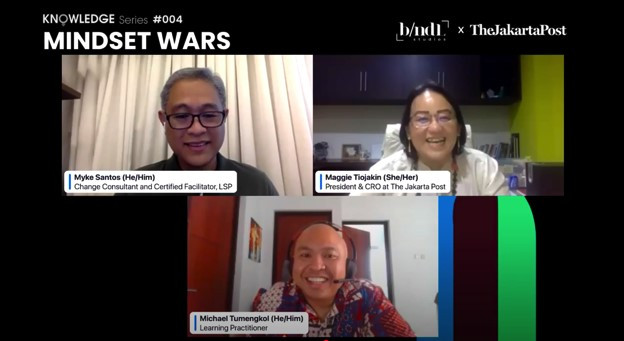Popular Reads
Top Results
Can't find what you're looking for?
View all search resultsPopular Reads
Top Results
Can't find what you're looking for?
View all search resultsChange in mind: Unlocking the way to sustainable learning and self-development
Change text size
Gift Premium Articles
to Anyone
W
hat comes to mind when you hear the word “learning”? For some, it's a lengthy process that takes a lot of effort and energy, while for others it's an exciting activity that opens new avenues full of possibilities.
These and other differing views reflect the overarching theme of the 4th episode of the Knowledge Series online workshop and webinar: “Mindset Wars: The Key to Lifelong Learning and Development”.
A collaborative series between The Jakarta Post and B/NDL Studios, the latest episode focused on talking about all the ways people can continue to learn and develop themselves in a professional setting.
Moderated by Maggie Tiojakin, the Post’s president and chief revenue officer, the “Mindset Wars” webinar was held on Oct. 4 with featured speakers Michael Tumengkol, a learning practitioner, and Myke Santos, a change consultant and certified LEGO Serious Play facilitator.
Michael kicked off the discussion with a presentation on sustainable learning, which also elaborated on the importance of finding one’s purpose in learning by asking questions like, why do you learn a specific skill?
“When talking about learning, we can look at it as huge and complicated, or we can simplify it by seeing it through our subjective lenses,” he said.
Michael provided an anecdotal illustration by explaining how he started learning his most recent skill, decompression. He decided to learn this because he loved snorkeling, and gaining this skill would enable him to better pursue this underwater activity.
“Sustainable learning can be understood through the 70-20-10 principle,” he continued.
“Like me with decompression, reading up on how to do it makes up 10 percent of the process. Observing my mentor, taking in their teaching, that makes up 20 percent. And lastly, what makes you capable of actually learning a skill is practice, which makes up 70 percent of the process. In a professional setting, this would be on-the-job experience,” Michael explained.
He concluded his presentation by reemphasizing that knowing oneself was the first part of seeking the why of learning. Only then could people start recognizing the steps they needed to learn a skill sustainably through regular practice.
Michael pointed out this mindset was essential for the continuous pursuit of self-development and updating one’s skills.
Myke continued the discussion by exploring how play could help people be more open and creative in a work setting, allowing themselves to create more diverse solutions and to be spontaneous without the burden of judgment.
“Einstein said that play is the highest form of research. Through play, people can explore, be creative and make connections,” he noted.
Drawing on his experience, Myke observed that the play mindset prepared members of a team for improvisation, an essential skill in an unpredictable world. By adopting the play mindset, people could more easily build new capacities through experimentation, which also facilitated continuous learning.
“Being grown-up doesn't mean you stop growing, so let's all have a mindset of play,” he enthused.
To be stay in the know for the next Knowledge Series episode, subscribe to The Jakarta Post here.










